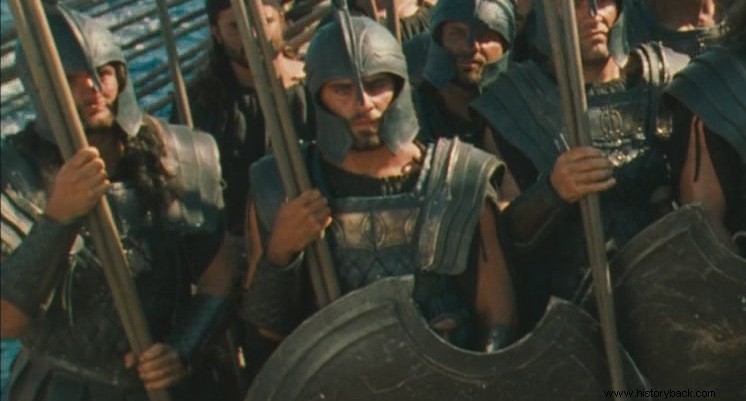
The inhabitants of Phthia were called Myrmidones in the Homeric era. They got their name from Myrmidon, son of Zeus and Eurymedusa, according to the legend. The same myth states that Zeus transformed himself into an ant in order to mate with the said princess, hence the name of their offspring.
Another version, however, wants the Myrmidons to come from Aegina, while a third and more likely version wants them to be descendants of the Thessalian lord Myrmidon who married the daughter of the king of Thessaly. Peleus, the father of Achilles was not a native but moved to Phthia. The Myrmidons were considered extremely loyal and obedient to their leaders so that the term Myrmidon is identified with today's concept of robot.
But the Myrmidons made history in the Trojan War. They were the famous Myrmidons of Achilles. The Myrmidons were armed, with round shield, spear, javelin and sword, helmets and breastplates. The Myrmidons were an elite unit, not because they carried innovative weapons for the time, but because of the aggressive tactics they used, inspired by their excellent warrior leader.
During the ten-year war with Troy and its allies, the Myrmidons overran and sacked a total of 23 Trojan-allied cities. Achilles was the hero who inflicted the greatest losses on the opposing camp. The Myrmidons, however, fought like other Achaean fighters, but they surprised the opponent with their momentum, relying on a quick, dashing attack to break opponents.
If the latter did not have the necessary training, cohesion and composure, it was certain that they would be swept away by the raid of the Myrmidons. In the Iliad, it is easy to see how much the Trojans valued and feared the Myrmidons and their leader, Achilles, despite the fact that they were few - only 2,500 men, according to the Iliad.
But their value was inversely proportional to their number and it was shown when Achilles himself retired and withdrew them from the battles. The Iliad describes their epic counterattack led by Patroclus that saved the Achaeans but cost the life of his brave cousin Achilles.
The attack of Patroclus should rather be seen as an extremely daring move, approaching the limits of self-sacrifice, which was aimed more at gaining time, in view of the arrival of the other Achaean forces and the concentrated counterattack of the Achaeans.
The coming of night brought relief to the Achaean camp. Achilles orders the body of the dead Patroclus to be treated and convenes a war council, which also hands him the master strategy for the upcoming fourth and final battle of the Iliad.
The Trojans tried to defend themselves on a narrow front, where the numerical superiority of the warriors would do them no good. So he arranged his army in the location between the hill of the new Ilium and the left bank of the Scamandros river. Opposite them stood the Achaeans, arrayed according to the shouts of Achilles.
Opposite Achilles applied a simple in conception but also ambitious in implementation plan with the center of gravity of his Myrmidons. The aim of the first Achaean warrior was not to press the entire length of the enemy front, but to break it up at a pre-selected point. Achilles did not intend to wear down his army with pointless attacks.
He would concentrate his forces against the enemy's center and simply occupy the opposing horns. Should they succeed in breaking the enemy front, the left Trojan horn would be trapped between Scamander and the Xanthos River and the Achaean forces and would be annihilated.
The Trojans, unaccustomed to the new tactics, fought bravely, but did not manage to hold their front. After a fierce fight, their center was split and the men who made up the right wing, led by Hector, fled towards the city, while the unfortunates of the left wing were trapped between the Achaean spears and the rivers and were slaughtered.
Hector, probably in his attempt to regroup his panicked parts, dueled with Achilles and met his death, with Achilles' spear tearing through his throat. With the death of Hector also ends the narrative of the Iliad, the one concerning the war movements of the wars. The epics of Ethiopis, Mikra Ilias and Ilio Persis now take the baton of storytelling.
